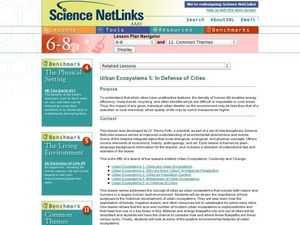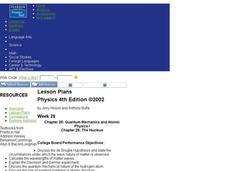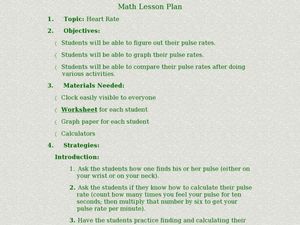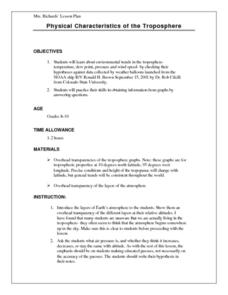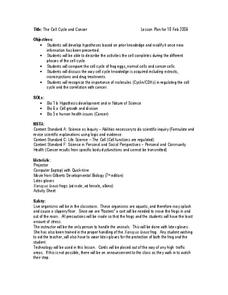Curated OER
TV Viewing
Students test a hypothesis to see if there is a direct correlation between number of hours of TV viewing and academic grade. They collect and compile data to enter on a spreadsheet and create a word processing document supporting their...
Curated OER
Water and Ice
Young scholars investigate what happens to solids and liquids when they change from one form to another. The amount od space taken by frozen water begins the discussion and students are led to formulate their own hypothesis to research.
Curated OER
Quantum Mechanics and Atomic Physics
Students will discuss the de Brogile Hypothesis and state the circumstances under which the wave nature of matter is observed. They will also calculate the wavelengths of matter waves.
Curated OER
Archaeology 2500: Texano Weapons
Students listen to oral story describing mystery artifact, work in groups to write descriptive report of artifact, and creatively form hypothesis based purely on misinterpretation. Students then explore and discuss difficulty of...
Curated OER
Physical Characteristics of the Troposphere
Learners examine troposphere graphs and mcompare their hypotheses with data collected by weather balloons launched from the NOAA ship, Ronald H. Brown. they write summaries about the physical properties of the troposphere.
Curated OER
Graphing Heart Rates
Students explore heart rates. They record pulse rates, predict which exercises cause a faster heart rate, make a chart, and graph the results. Students write an essay using the data to support their predictions. They write a hypothesis...
Curated OER
Powerful Images
Students discuss and define the idea of a powerful image. In groups, they use the Internet and magazines to search for images they deem as powerful. They develop a hypothesis to why some people believe an image is powerful while others...
Curated OER
Field Experiments on Succession
Student develop a hypothesis regarding the effects of either mowing or fertilizer upon the diversity of plant species in a grassland ecosystem. They set up experiment field plots and measure species richness.
Curated OER
Where Do Green Plants Get Energy?
Fourth graders realize that plants need light, water, and carbon dioxide to carry out photosynthesis. They participate in groups of 4 to plant (with materials provided) a test group of beans to compare to the control group, write a...
Curated OER
Hare vs. the Tortoise
Seventh graders identify and create questions and hypotheses, dependent and independent variables and form a conclusion that can be answered and tested through scientific experimental investigation. In this relationship lesson, 7th...
Curated OER
Soil Sample Lab 2
Students examine each soil sample and record observations. In this biology lesson, students design an experiment to test soil flow rate. They write a lab report about the experiment.
Curated OER
Physical Characteristics of the Troposphere
Students lexplore environmental trends in the troposphere- temperature, dew point, pressure and wind speed- by checking their hypotheses against data collected by weather balloons.
Curated OER
Effects of Nitrate and Phosphate Changes on the Growth of Algae
Students determine the effects of an increase of the amount of nitrate and phosphate levels on the growth of algae. the development of a hypothesis is encouraged and students proceed to a conclusion based on their results.
Curated OER
Struggle for Existence and Population Growth in Aphids
Students examine the population of aphids. They identify adaptations they have made for their environment. They make predictions, test their hypothesis and collect information that either proves or disproves their theory.
Curated OER
The Cell Cycle and Cancer
Students compare and contrast the cell cycle of frog eggs, normal cells, and cancer cells. They watch a video about early development of the frog embryo, generate a hypothesis in small groups, and listen to a teacher-led lecture. ...
Curated OER
FLY HIGH!!!
Students create their own bird study in their own schoolyard using the scientific method (see Testing a Hypothesis in Join the Project). Students do research in the library, at a local college, or on the Internet to determine the...
Curated OER
Colors/colors
Students make a prediction/hypothesis based on what you currently know about "mixed messages".
Curated OER
Explor-A-Pond: 5th Grade Soil Erosion
Fifth graders compare and contrast the rate of soil erosion along water and along a vegetation area. They observe the differences and record their information and write a hypothesis of what they think happen if the erosion continues.
Curated OER
Kari's Earth Care
Students explore caring for their community. They select an area of a park to clean and collect trash. They place materials in trash bags to recycle plastic, paper, etc. They calculate the amount of items and percentages they collect...
Curated OER
Subject Selection in Clinical Trials
Students design and conduct an experiment to test a hypothesis. They create a question/objective based on the results of their experiment that can be answered by performing a human clinical trial. Students write inclusion and exclusion...
Curated OER
How Can You Prevent Spoilage?
Students complete laboratory activity to discover what temperature is most effective in prohibiting bacterial growth in two percent milk. Students then write lab report detailing findings.
Curated OER
Research Project
High schoolers identify the components of the Results section of the project and technical paper.They also identify appropriate ways of presenting data and write the Results section of the technical paper.
Curated OER
Butterfly Life Cycle
Third graders investigate the life cycle and development of butterflies. They complete an online WebQuest, and write journal entries about their research information. Students create a poster, and observe real Painted Lady larvae...
Curated OER
Lead Detection
Students hypothesize whether the soil sample may have lead contamination and why. They describe what they see happening with the soil samples and the corresponding swabs. Pupils write a brief description of what they observe as the...

